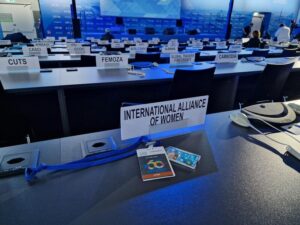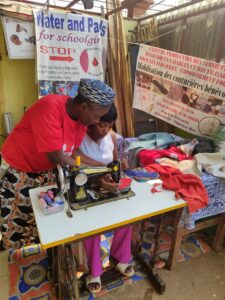 Promoting Gender Equality through Quality Public Education Systems and Services
Promoting Gender Equality through Quality Public Education Systems and Services
Nelson Mandela once said “Education is the most powerful weapon which you can use to change the world”. Education is essential in achieving gender equality. Education can ensure better health outcomes for women and girls, reduce child marriage, narrow the pay gap and empower women to take leadership positions.
Yet, only 44% of member states have fully committed to gender equality in education according to the UNESCO Global Education Monitoring Report 2018. Member states have both the obligation to close gender inequalities in education and use education as a tool to foster a gender-equal world.
Increased efforts are needed to tackle the systemic barriers in accessing education for women and girls based on the intersection of gender, race, income and location as well as to ensure safe and non-discriminatory learning environments.
Addressing Systemic Barriers for Marginalized Women and Girls
Women and girls in developing countries are more likely to never go to school. In fact, 16 million girls worldwide will not attend school. Globally, harmful traditional practices, child marriage and gender stereotypes prevent women and girls from accessing education. Living in poverty and the lack of school services in close proximity to their homes can also deter women and girls from securing education at all levels. In the Global North, Indigenous women and girls also face systemic barriers to accessing education and a lack of school services in close proximity to their communities.
Early Childhood Education and Care
Only one in two children globally are enrolled in early childhood education and care. Unlike primary and secondary school, early childhood education and care is still predominantly seen as a private responsibility rather than a state responsibility. This is despite being highlighted as a human rights issue in human rights conventions and agreements such as the Convention on the right of the child. In Canada, early learning and child care services remain unavailable and inaccessible for many families due to high fees, limited licensed spaces and a market-based approach to service provision.
Publicly funded high quality, accessible and affordable early learning and child care can have a transformative impact on children, women and the economy. Early learning and child care is proven to guarantee better developmental outcomes namely by improving school readiness and social integration. Moreover, it can shift the weight of unpaid care work that is traditionally put on women and support gender equality by enabling women to pursue education and skills training as well as securing formal jobs, full time work, and building businesses. Financial institutions such as the IMF and the OECD have also highlighted its cost effectiveness and its high positive impact on economic growth.
Women and Girls Living in Poverty
Women and girls living in low-income families are more likely not to enter school or to drop out of school. This can be explained by the inability to afford fees related to schooling such as textbooks and transportation, and a gender bias favouring boys’ education in some countries. Social expectations for girls to perform care and domestic tasks disproportionately affect girls and women in low-income families.
Securing access to education for girls cannot be isolated from ensuring access to other services and essential infrastructure such as drinking water and sanitation, health and reproductive health services, and safe and adequate housing.
Privatization
The High Commissioner for Human Rights highlights that an increased privatization of school has negative impacts on accessible and free quality education as it can generate disinvestment in public education. This has a direct impact for girls and women’s education. Discriminatory admission requirements as well as the potential lack of compliance with the national curriculum in the private sector are also deterrents to girls’ participation in school.
Women and Girls in Rural and Remote Settings
A majority of women and girls who cannot read come from rural and remote settings. Women represent two thirds of adults who are unable to read or write, a statistic that has not changed in 15 years. Technology can play a key role in providing education and skills training for individuals in rural and remote settings. A focus should also be given to improvement of infrastructure in rural areas with gender-sensitive facilities such as clean and safe sanitary facilities along with safe transportation and culturally sensitive education.
Literacy, Vocational and Skills Training
Vocational and skills training needs to be relevant and to adapt to the changing labour market context. Most adults in middle and low income countries still struggle with basic information and telecommunication technologies (ICT) according to the International Telecommunications Union. Women need to access ICT as well as digital literacy training in order to facilitate their integration into the labour market, to empower them and strengthen their social and financial independence and leadership potential through access to information.
Ensuring Safe and High Quality Learning Environments
Ending Violence in Schools and on Campuses
Gender-based violence is prevalent in many schools and campuses around the world with an estimated 246 million children experiencing school-related violence every year. It has severe impact on women and girls’ well-being, rights and ability to complete an education. Prevention of and response to sexual violence at all levels of education is crucial.
National standards and legislation accompanied by strong transparent monitoring mechanisms are needed to address sexual violence in schools and on campuses.
An inclusive and comprehensive health and sexuality education in primary and secondary school, where concepts such as consent and bystander intervention are taught, can contribute to preventing gender-based violence. Also key to tackling the issue is the training for teachers, staff and students on reporting mechanisms and on the root causes of gender-based violence.
High Quality Unbiased Education
Educational content should be free from gender bias and stereotypes, promote equal relationships and provide gender-responsive instruction. However, many textbooks still reinforce stereotypes, namely by representing women only in specific roles. A teacher’s own gender bias can also contribute to gender inequality in the classroom. In its report on the Realization of the equal enjoyment of the right to education by every girl, the High Commissioner for Human Rights points to the State’s responsibility to ensure that textbooks, curricula and programmes promote gender equality and dismantle harmful stereotypes. Training for teachers and staff in the use of evidence-based teaching and learning strategies to provide education that promotes gender equality and human rights is of significant importance.
We urge member states to:
– Commit to gender equality in education by adopting laws, policies and action plans, strong and transparent monitoring and accountability mechanisms as well as investment in capacity building to identify best practices.
– Ensure access at all levels to quality public education systems, and infrastructure that are gender-sensitive, including primary, secondary, and tertiary education, as well as publicly funded accessible, affordable, inclusive and quality early learning and child care.
– Provide funding to cover indirect costs of education for marginalized populations such as women and girls in poverty as well as strategies and services for such community development as safe drinking water, safe housing and health and reproductive health services.
– Improve access to ICT especially for girls living in rural and remote communities and invest in lifelong learning training that includes ICT skills and digital literacy.
– Ensure that textbooks, curricula, programmes and teaching methods promote gender equality and dismantle harmful stereotypes based on gender, race and religion.
– Provide training for teachers and staff on gender biases and evidence-based gender sensitive curricula that is culturally sensitive and promote human rights and gender equality as well as training on the root causes of gender-based violence and reporting processes.
– Increase and target development assistance investments to support gender equality in education.
In conclusion, education and gender equality are at the heart of the 2030 Agenda for Sustainable Development. Efforts to ensure SDG4 inclusive and equitable quality education need to fully integrate the commitments to SDG5 to achieve gender equality and the empowerment of all women and girls.
The Canadian Federation of University Women (CFUW) is a non-partisan, voluntary, self-funded organization with over 100 clubs, and close to 8400 members located in every province across Canada. Since its founding in 1919, CFUW has been working to improve the status of women, and to promote human rights, public education, social justice, and peace.
Statement endorsed by:
- Canadian Research Institute for the Advancement of Women
- Graduate Women International
- International Alliance of Women
- National Council of Women of Canada
- YWCA Canada



